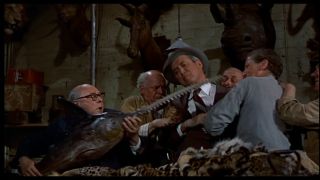The MacGuffin: News and Comment (01/Sep/2012)
(c) Ken Mogg (2012)
Sep 1
Hmm. Don't know if I can round off this discussion of Hitchcock and The Absurd (with particular reference to The Birds) in just one more post! But anyway I'll start with something I claimed last time. I cited the 'Encyclopaedia Britannica': 'The English novel contains a rich vein of the comic grotesque that extends at least back to Dickens and Thackeray and persisted in the 20th century in such varied novels as Evelyn Waugh's Decline and Fall (1928), Angus Wilson's Anglo-Saxon Attitudes (1956), and Kingsley Amis's Lucky Jim (1954).' Fair enough, up to a point - such a 'comic grotesque' tradition is certainly present in Hitchcock. For example, the taxidermist's scene in The Man Who Knew Too Much (1956), which becomes a wild melée - a 'life' and 'death' affray amidst the stuffed carcasses (see frame-capture below) - clearly owes something to the scenes in Dickens's 'Our Mutual Friend' (1865) featuring the taxidermy shop of Mr Venus. That shop is crammed with stuffed animals, preserved babies, and articulated [assembled] human skeletons. At one point, someone slams the street door, and the whole grisly population is shaken into momentary 'life' ('paralytically animated' in Dickens's phrase). And Mr Venus himself is a comic character, a Cockney, whom Hitchcock would have delighted in reading about. Listen to Mr Venus talk: 'If you was brought here loose in a bag, to be articulated, I'd name your smallest bones blindfold ... and I'd sort 'em all, and sort your wertebrae, in a manner that would equally surprise and charm you.' But does the scene remind you of anything? Well, for one thing, we were speaking of cluttered shops, such as the Bodega Bay general store in The Birds, and one can see how its clutter is a metaphor for advancing time and encroaching old-age - mortality again. There are several such shops in Hitchcock. Think of Pop Liebel's crammed bookshop in Vertigo (where Scottie and Midge listen to stories about 'the small stuff of history' while darkness descends), of the Copenhagen bookshop in Torn Curtain (whose proprietor with a hearing-aid, Freddie, ticks off a young assistant, saying, 'Them religious books is in a 'ell of a shambles, Magda'), and of the stone mason's establishment in Family Plot (where the mason consults his extensive file index after telling his young assistant, a girl named Marsella, to turn down her transistor radio whose noise seems disrespectful to the dead). But those 20th-century English novels mentioned by the 'Encyclopaedia Britannica' are notable not just for their broad grotesqueries but for their uproarious depictions of whole tranches of English society containing many hypocrisies and absurdities - something which Hitchcock's films, by the restricted nature of cinema, can't really match. So that's another reason why a film like The Birds is finally closer to the Theatre of the Absurd and to the relatively contained, pessimistic - and generalised - observations found in plays by, say, Ionesco. (I'm not saying that Hitchcock didn't relish the sorts of things he may have read in, for example, Angus Wilson's satiric 'Anglo-Saxon Attitudes'. His friend, the writer V.S. Pritchett, whom he consulted about the script of The Birds, reviewed Wilson's novel more than favourably, and may well have told Hitchcock about it. A description of the novel refers to its 'vivid cast of characters that includes scheming academics and fading actresses, big businessmen toggling between mistresses and wives, media celebrities, hustlers, transvestites, blackmailers, toadies, and even one holy fool' - the sort of stuff Hitchcock reportedly loved hearing about! Oh, and another description of Wilson's novel calls it 'Dickens for the smart set', and Wilson himself, an academic and one of England's first openly gay novelists, also wrote the excellent book 'The World of Charles Dickens' (1970).) So where are we, apropos The Birds in particular? Well, I suggest that both Hitchcock and Ionesco were influenced by the pessimism of the philosopher Schopenhauer: Hitchcock would have acquired such an influence via his love of the Symbolist painters, and we know that Ionesco read both Schopenhauer and Plotinus (both philosophers were key influences on the Symbolist movement and its pessimism). In any case, I believe that both Ionesco and Hitchcock sought not to 'shirk the realities of the human mind with its ... fear and loneliness in an alien and hostile universe' (that's a description of Absurdist subject-matter by Martin Esslin, Introduction to Penguin Plays edition of 'Amédée', et al., p. 23). Sure, they both sought to practice their stagecraft or filmcraft, and to 'lighten up' the general pessimism with - precisely - comic and 'absurd' emphases. (For example, both saw how people readily succumb to regimentation. In Family Plot, parishioners watch with 'religious politeness' as their archbishop is kidnapped before their eyes, and fail to move until it's too late. Similarly, Hitchcock obviously relishes the polite drolleries in The Trouble With Harry - such as Miss Gravely's famous line as she greets a possible murderer, 'What seems to be the trouble, Captain?'.) But that's enough! Sufficient clues may be found above ...
This material is copyright of Ken Mogg and the Hitchcock Scholars/'MacGuffin' website (home page) and is archived with the permission of the copyright holder. |

